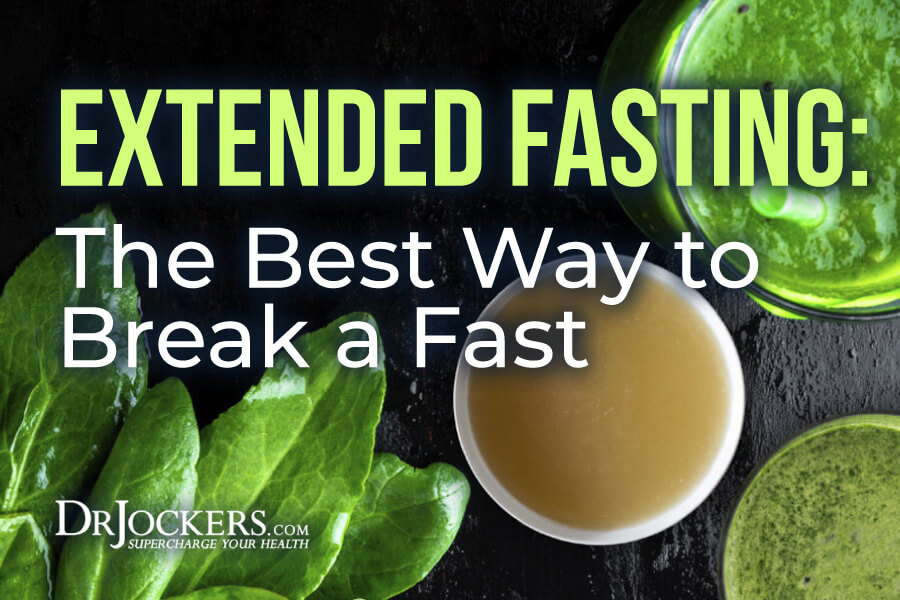 Extended Fasting: Best Way to Break the Fast
Extended Fasting: Best Way to Break the Fast
Extended fasting is one of the most ancient and powerful healing strategies known to mankind. Our scientific literature is demonstrating how this reduces inflammation, stimulates autophagy for cellular cleansing and initiates the production of stem cells to regenerate new tissue. In this article, I will go over the best strategies for breaking an extended fasting regimen and how to reintroduce foods appropriately.
When you do an extended fast it can be dangerous to add too much foods and certain types of foods back into your diet right away. There is a potentially fatal medical condition called refeeding syndrome that may occur if food is not reintroduced properly.
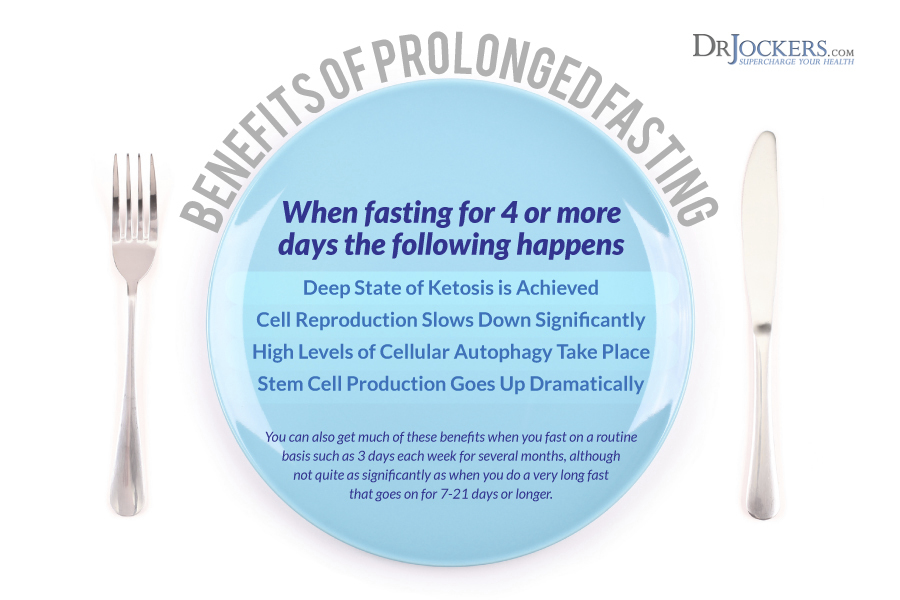
What is Extended Fasting:
My definition of an extended fasting regimen is any sort of fast with less than 25% of your normal calorie load for more than 48 hours.
This may include doing a strictly water fast, a water and salt fast, a bone broth fast or juice fast. I believe you get the best results from a water and salt fast, but any sort of extended fast where you are consuming less than 25% of your normal calories and doing it in a liquid form will have tremendous healing benefits.
Anyone who has done a 7-day green juice fast will tell you how great they felt through the process. So even if it doesn’t stimulate as much autophagy and stem cell development as a water fast, there is no doubt it is doing tremendous good for the body.
I encourage my patients and followers to engage is some sort of an extended fast of 3 or more days at least one time per year to clean up bad cells, take stress off of the digestive system and rebuild the body.
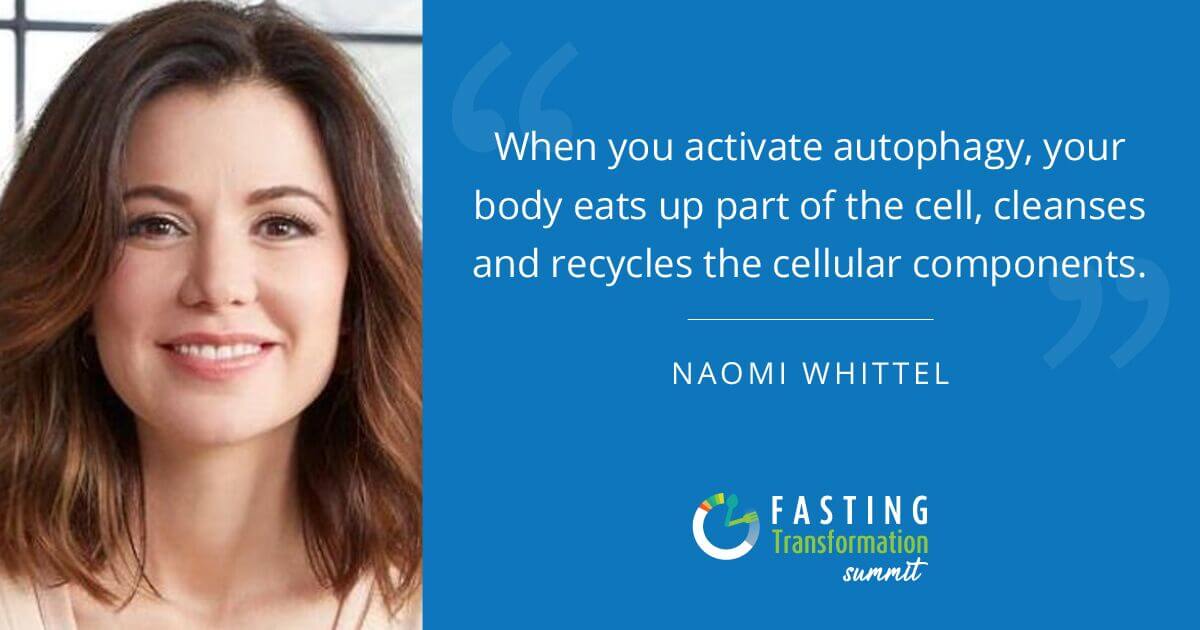
What is Refeeding Syndrome:
Refeeding syndrome is a potentially fatal condition that results from the shifts in fluids and electrolytes that occur when people who are malnourished from long-term calorie restriction receive too much food to quickly. These shifts result from metabolic and hormonal changes that impact electrolyte balance and fluid movement in the body (1).
The hallmark biochemical feature is hypophosphataemia where phosphorus levels in the blood drop dangerously low. In addition, sodium, potassium and magnesium can drop very low and their can be major abnormalities in glucose, protein and fat metabolism.
In order to avoid experiencing refeeding syndrome, it is critical to add the proper foods back in the right amounts over time.
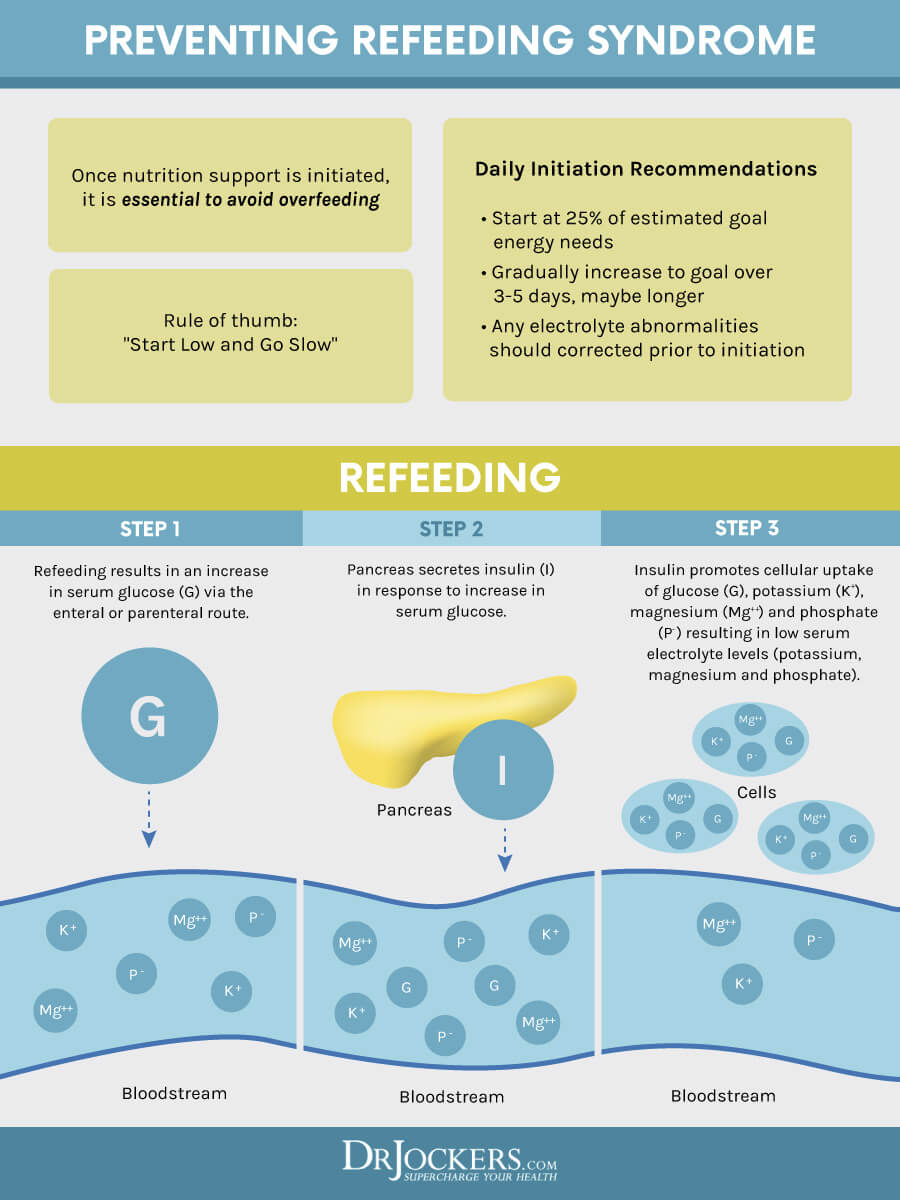
What Happens to Your Digestive System When Fasting
After roughly 48-72 hours of fasting, the digestive system goes into a sort of hibernation where you stop producing digestive juices. It takes a lot of energy for the body to produce stomach acid, bile and pancreatic enzymes.
When we go on an extended fast the body shifts its metabolic system to preserve as much energy as possible and since we aren’t needing digestive juices, we shut down this continuous production of these elements. If we reintroduce foods too quickly without warming the body up it can be really challenging on our gut and cause pain and discomfort.
This is why it is so important to reintroduce liquid calories and foods that are very easy on the digestive system such as broths, soups, smoothies, certain fruits and veggies, fermented foods, etc.
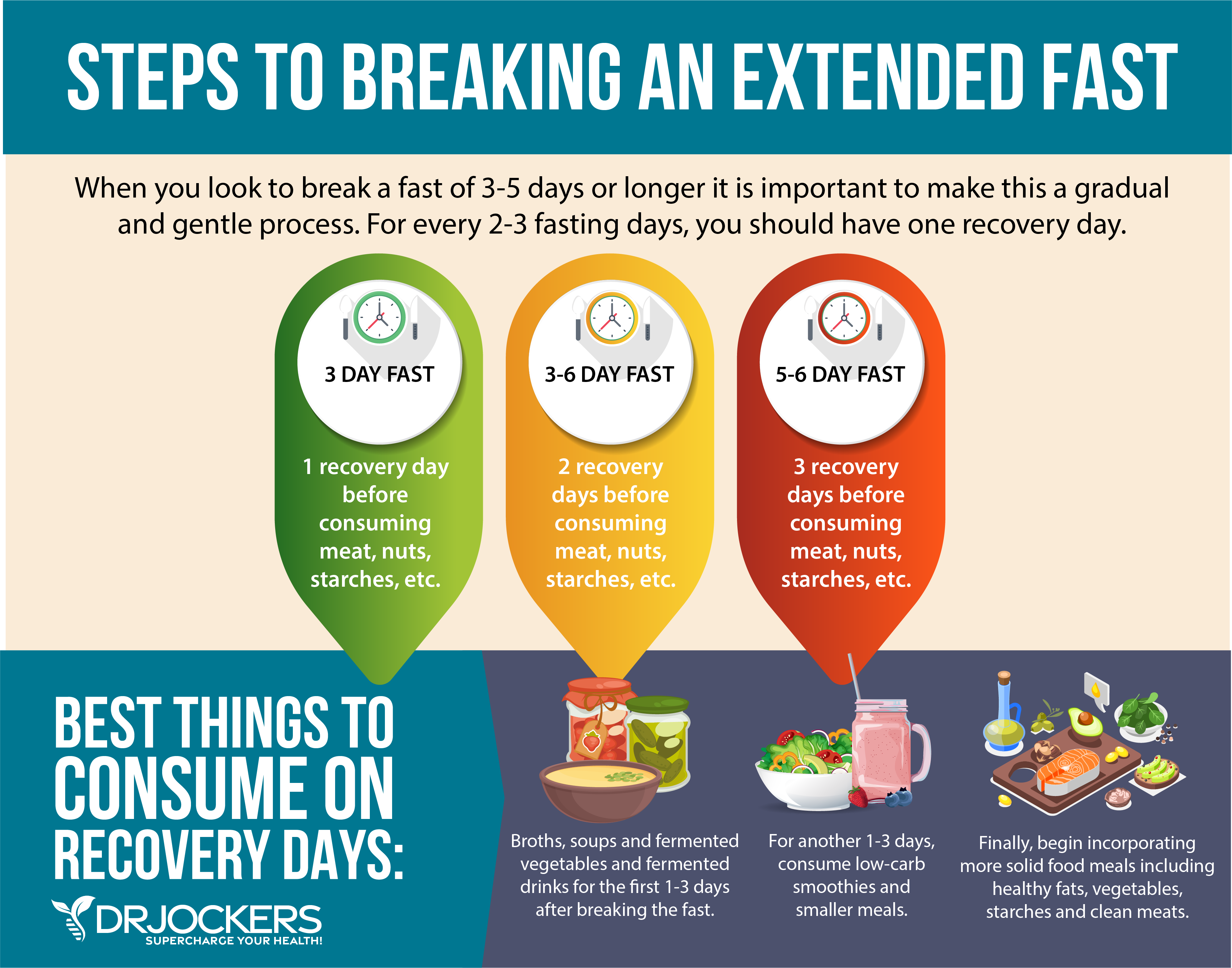
Food ReIntroduction:
The general principle I use is for every 2-3 fasting days, you should have at least one recovery day. On your recovery days, you should aim to gradually increase your calories from foods that are very easy on the digestive system.
So, if you do a 5 day fast, you should take 3 days to get back to your normal food and calorie consumption. If you do a 10 day fast, you should take 5 days to get back to your normal food and calorie consumption.
I like the following schedule for adding back calories for a 5 day fast. Day 1 should be roughly 30-40% of normal calorie load. Day 2 should be about 50% of the normal calorie load. Here is a chart with more details. This takes into account the average basal metabolic rate (BMR) for a man and a woman.
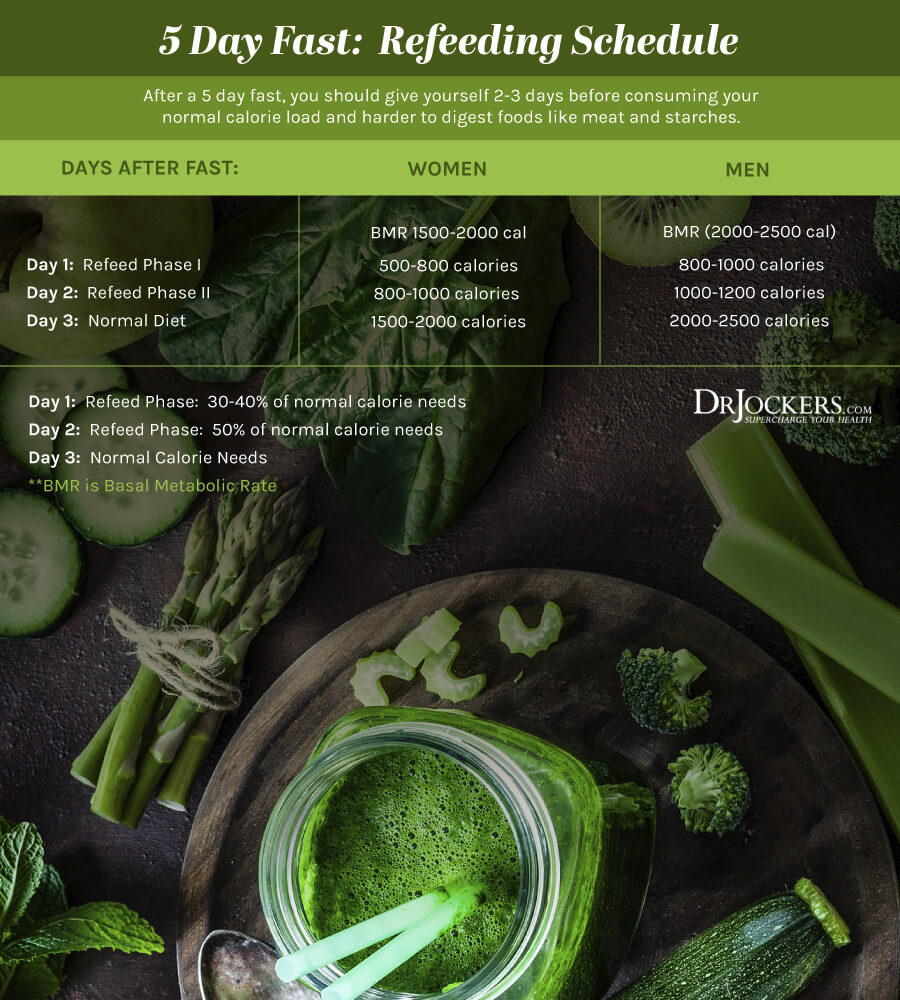
10 Day Water Fast
If we are doing a 10-day water fast than you would want to follow a 5-day transition period where the first 4 days are very gentle food reintroduction. This is a very conservative refeed schedule that caters to individuals who are more sensitive and have suffered with compromised health prior to beginning the fast.
You may notice that by day 4 you are ready for your normal calorie load. If you have been healthy before beginning the fast, then it is probably fine for you to increase calorie intake. But be sure to listen to your body and be in a relaxed state when you consume larger meals so your body can focus all its energy on producing the digestive juices needed for effective digestion.
If you have struggled with digestive issues in the past, I would recommend doing this gradual process that I have outlined below so you don’t overwhelm your system too quickly. There is no real downside to taking your time on the refeeding schedule. Even if you are underweight, once you get back to your normal calorie load you will begin putting weight back on.
Here is a schedule to follow
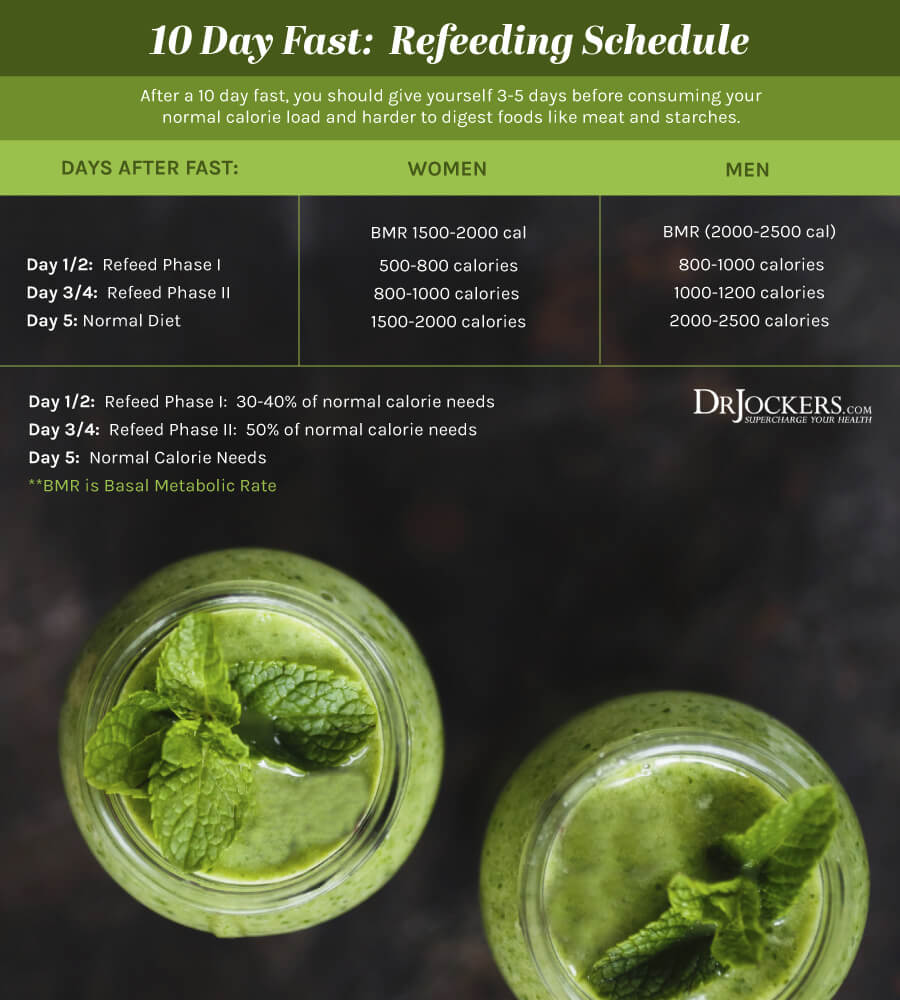
Longer Fasts
If you are doing longer than 10-day fasts, remember the ratio of 1 recovery day for every 2-3 fasting days. So, if you do a 20 day fast, you want a 7-10 day food reintroduction and you would stay at the refeed phases for 3-4 days each.
If you have a history of digestive issues, it is best to stay conservative at the 1 recovery day for every 2 fasting days. If you were experiencing good digestive health prior to the fast, you should be fine with doing 1 recovery day for every 3 fasting days.
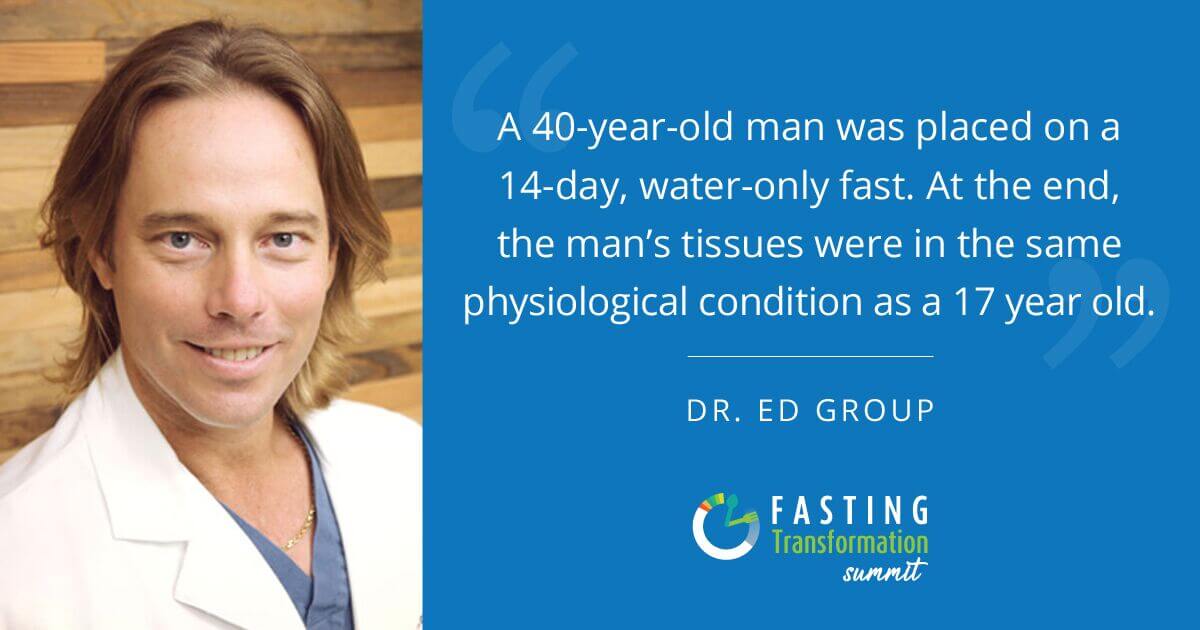
Best Foods to Use When Breaking a Fast:
The foods you want to use when breaking a fast must be easy on the digestive system. On phase I of the refeeding, I only recommend consuming liquid foods such as bone broth or vegetable broth, protein smoothies and green juices, fermented drinks, fermented veggies, fruit and well steamed veggies.
On phase II, you can add in raw vegetables and healthy fats like avocado, coconut fats and olives. You can also do well cooked vegetable soups and stews in bone broth or vegetable broth. I hold off on meat, eggs, dairy and starches until you get to your normal eating days.
Here are some things I am a big fan of including in your refeeding process. If you have had issues in the past with any of these, I would recommend avoiding them. No reason to try something you didn’t tolerate well in the past back during the refeeding process. You want this to be as minimally stressful as possible on the body.
Do your best to get organic ingredients as you don’t want to bring toxic chemicals into the system after undergoing this extended fast. If you can’t find organic produce, at least wash it off real good before consuming.
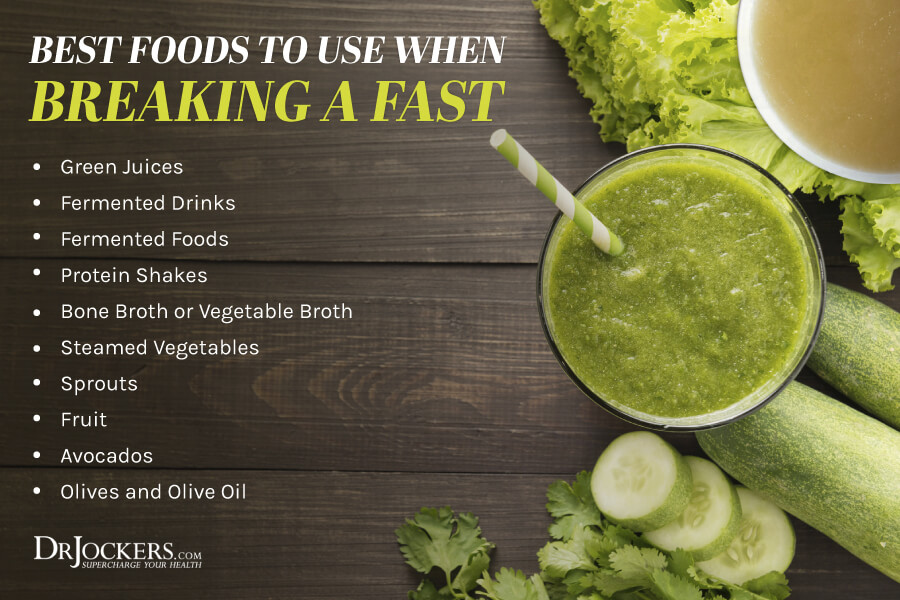
Green Juices
Green juices contain high doses of vitamins, minerals, and live enzymes in their most bioavailable form. Juicing greens helps to remove the fibers and allows the body to consume micronutrients and enzymes without having to use much energy in the digestive process.
This is a great way to get valuable nutrients into the body and gently rev up the digestive system so it will adapt faster to consuming other foods. The image below will give you a basic guide for making green juice and you can find other recipes in this article
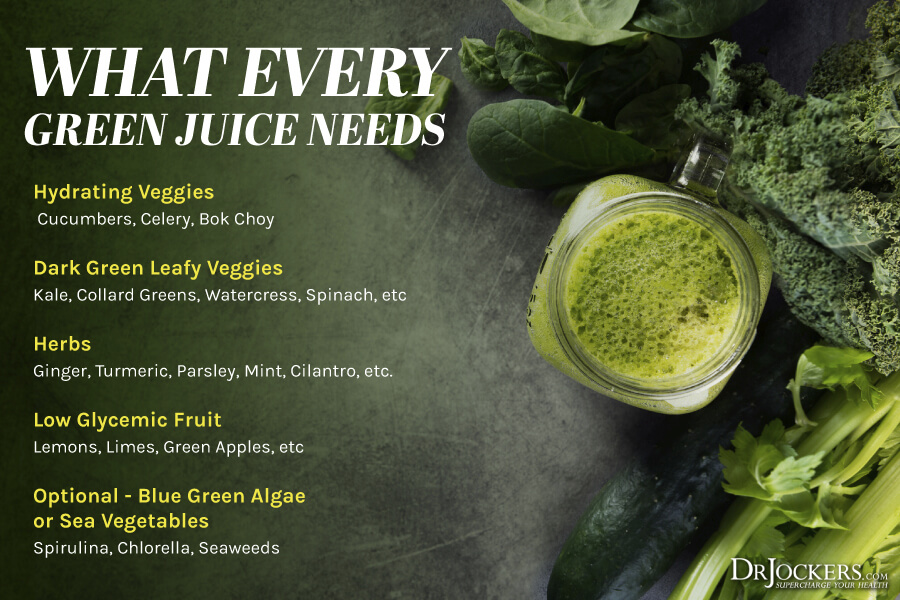
Fermented Drinks
Fermented drinks provide organic acids, B vitamins, enzymes and probiotics. Some good drinks here include coconut water kefir, kombucha and water kefir. These all contain natural sugars that will help to refuel your glycogen stores and powerful compounds that will help to reset your microbiome.
Other fermented drinks you could do that have little to no calories include sauerkraut juice, pickle juice and apple cider vinegar. The minerals and organic acids in these are great for giving your microbiome and cellular energy systems a boost.
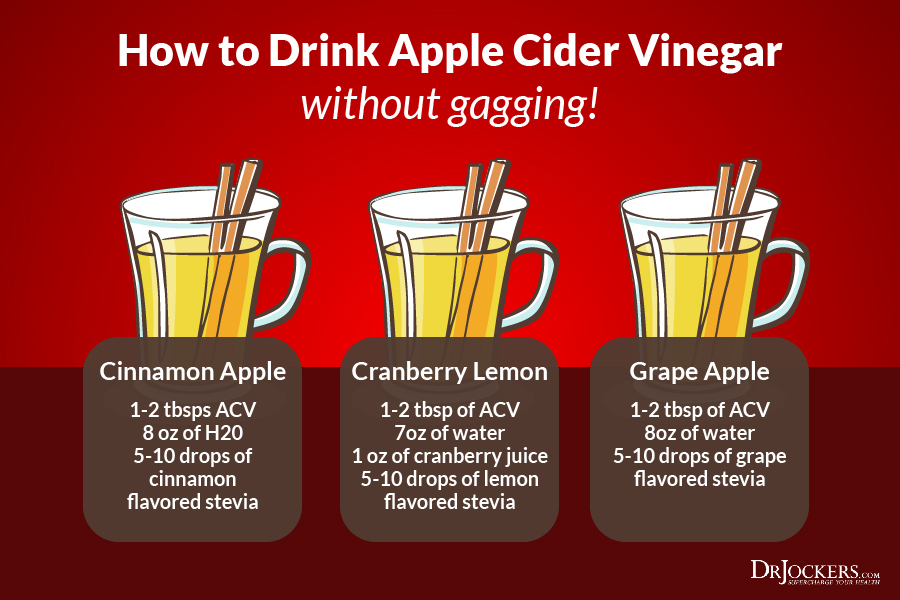
Fermented Foods
This would include things like sauerkraut, pickles, kimchi and other fermented vegetables. These are fantastic for providing probiotics and prebiotic fibers to get the gut microbiome some nourishment as it recolonizes your gut lining.
Other fermented foods would include coconut milk yogurt or kefir. I would be very careful adding this in on phase I of the refeed. You may just add a little at a time since these are very calorie dense with healthy fats. Your body may struggle with producing the bile needed on phase I to digest these and that can leave you with nausea and acid reflux. By phase II of the refeeding phase, adding in coconut fats in moderation is typically well tolerated.
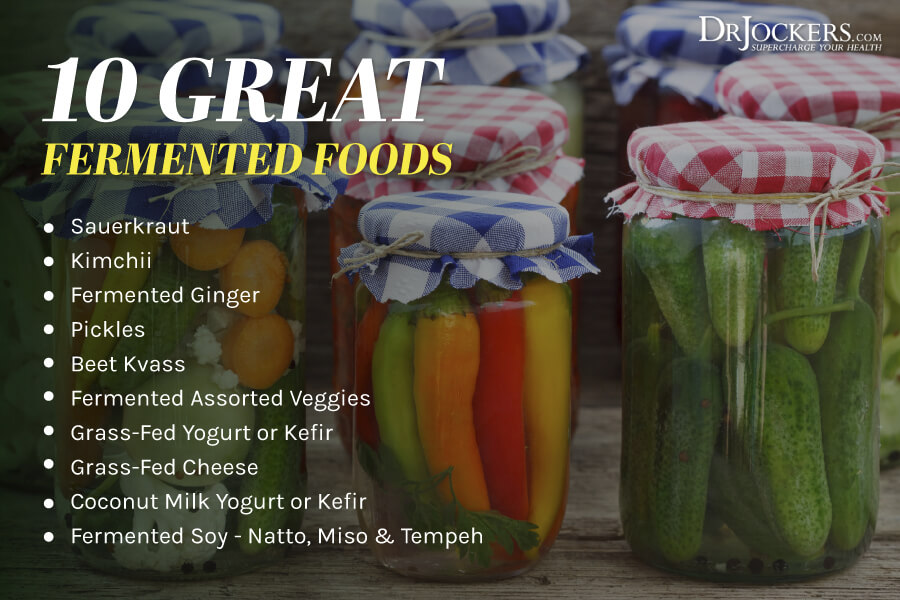
Protein Shakes
Protein shakes are a fantastic thing to bring into the body during phase I and II refeeding after extended fasting. You can do something simple like taking a carton almond or coconut milk and combining it with a good organic bone broth collagen protein or a vegan protein such as pea, rice or hemp protein.
It is important to not put too much coconut fats into your shake too quickly. I would recommend less than 10 grams of coconut fats per meal as too much too quickly can cause unwanted digestive disturbances. Most carton variety brands have around 5 grams of fat in each cup. So if you use 1 cup or so you should be fine.
If you want to add organic berries to this shake that is great as they are rich in polyphenol compounds and prebiotics. I would limit it to 1/2 cup of berries per meal so you don’t get too much fruit sugar all at once.
I like using the Gut Healing Protein powder, which is a vegan powder that contains a full multi-vitamin and a ton of anti-inflammatory compounds that improve phase I-III liver detoxification. It also contains healthy prebiotic fibers and gut healing nutrients. This is a fantastic product to use for to support the recolonization of the microbiome.

Bone Broth:
Bone broth can be made from any animal with bones and the most popular soup bones include those of fish, chicken, turkey, beef, lamb and venison. The bones house a variety of powerful nutrients that become released when they are slowly simmered in water for a few hours. These nutrients include bone marrow which helps provide the raw materials for healthy blood cells and immune development.
Other valuable nutrients include collagen, gelatin, hyaluronic acid, chondroitin sulfate, glycosamino glycans, proline, glycine, calcium, phosphorus, magnesium and potassium. These all help with the development of a healthy intestinal lining, strong joints, bones, ligaments and tendons as well as beautiful hair and skin (2, 3, 4, 5)
You can either make your own bone broth or you can buy it in many grocery and health food stores. Premade bone broth comes in both liquid and powdered forms. My favorite brand of liquid premade bone broth is Kettle & Fire (here) while my favorite powdered form is the organic bone broth collagen protein that you can use in smoothies and shakes to get more of these key nutrients. We carry this product in a sugar-free vanilla and chocolate.
Steamed Veggies:
Steamed veggies are a fantastic thing to bring into the body during both phase I and II of the refeed. We want to steam the veggies in order to break down the outer cellulose fibers that are challenging on the body to digest. As an example, many people suffer with gas and bloating after eating raw broccoli or cauliflower. This is in part, due to the challenges in breaking down these outer fibers.
In phase I of refeeding from extended fasting, I recommend deeply steaming veggies such as broccoli, cauliflower, carrots, peas, green beans, etc. These should be steamed to the point where they can easily be mashed up like baby food. The more your food resembles what a baby would consume the easier it is on your digestive system. In phase I, I recommend adding in 1/2 tsp of olive oil and in phase II you can do 1-2 tsps of olive oil on your steamed veggies.
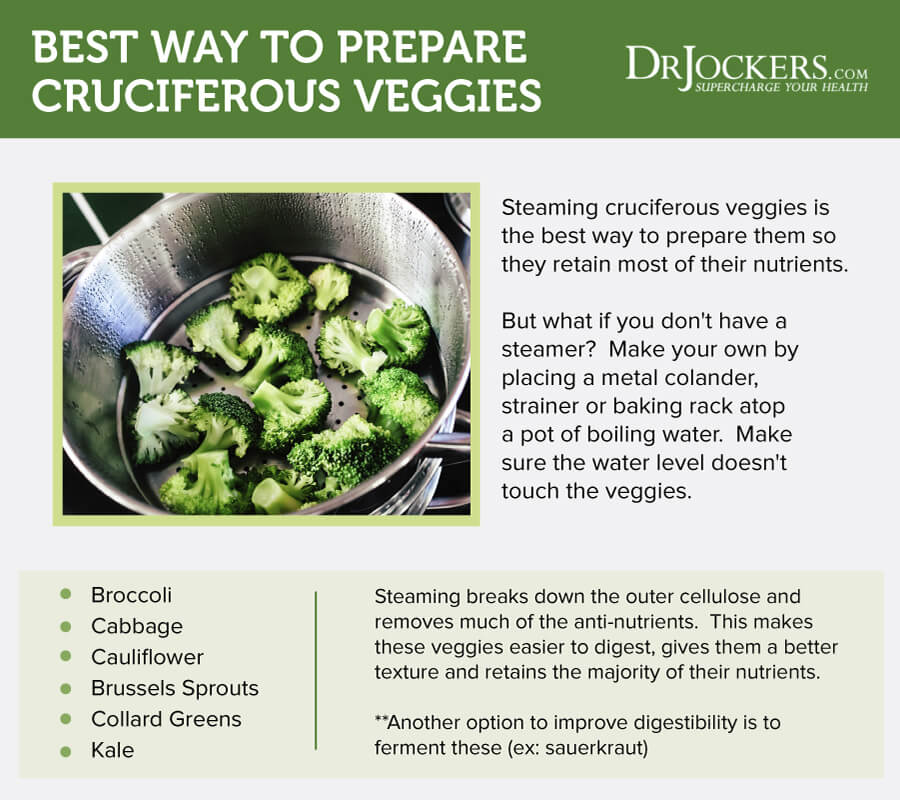
Sprouts
One of the most bioenergetic and micronutrient rich foods on the planet are plant sprouts. They also have little to no calories and are very easy on the digestive system. Consider getting some broccoli, kale or radish sprouts which are all high in glucosinolates that help boost up glutathione to enhance cellular protection and detoxification.
Other good sprouts to get would include Mung Bean sprouts and alfalfa sprouts which often easily available at most health food stores. You can often find these sprouts at a local health food store.
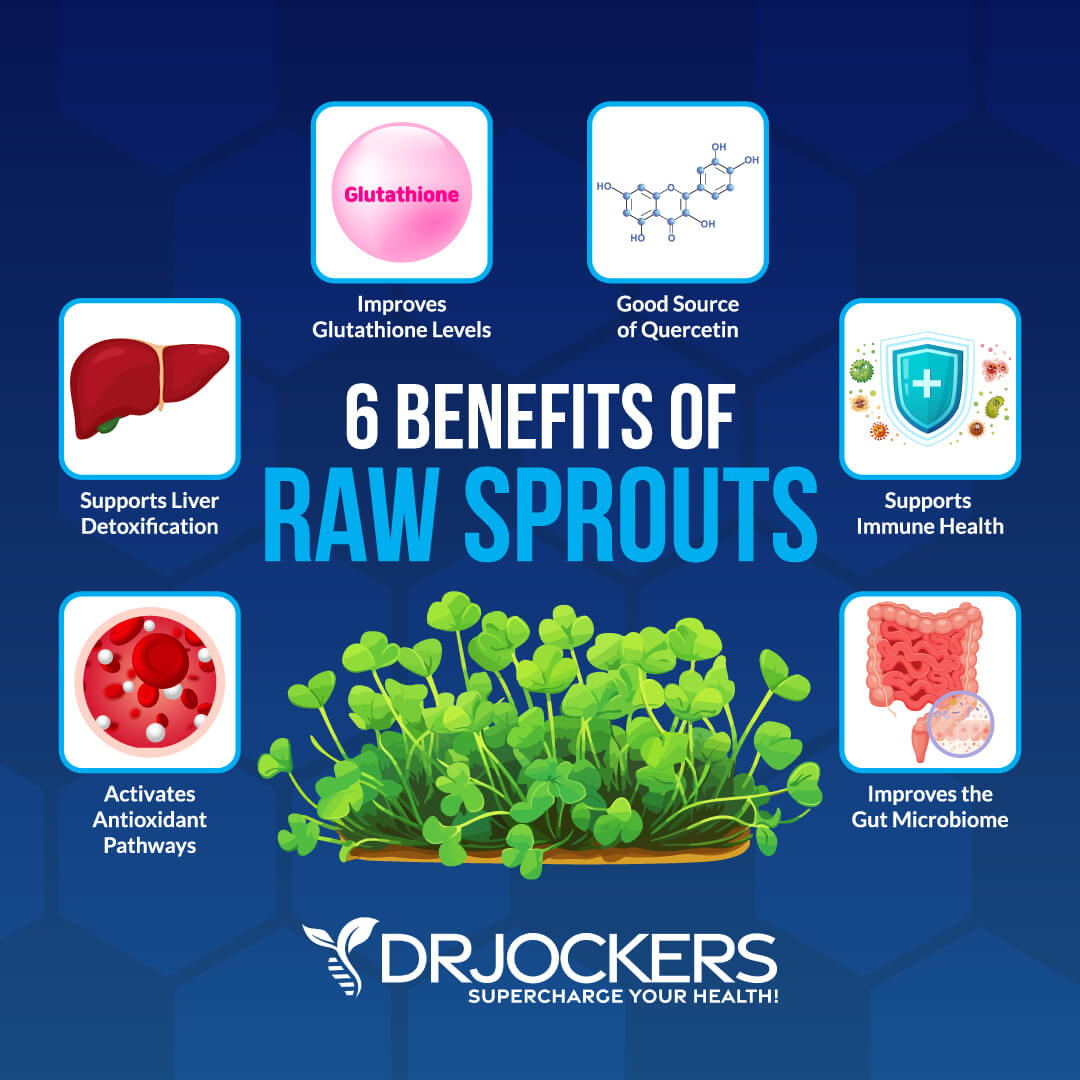
Berries and Other Fruit
You can absolutely enjoy some terrific fruit as you come off of your extended fasting experience. Fruit in moderation is easy on the digestive system and is full of enzymes, prebiotics and polyphenols to help support the developing microbiome.
I wouldn’t recommend consuming a huge load of fruit as the fructose sugar can overwhelm the liver. My favorite fruits to use would include granny smith apples and organic blueberries, raspberries, cranberries or blackberries. These are the lowest in sugar and the richest in antioxidant compounds.
Other great fruits that are rich in nutrients include kiwi, papaya, pineapple and cherries. These are high in sugar so be sure to keep your consumption to roughly 1/2 cup per meal and no more in the refeed phase.
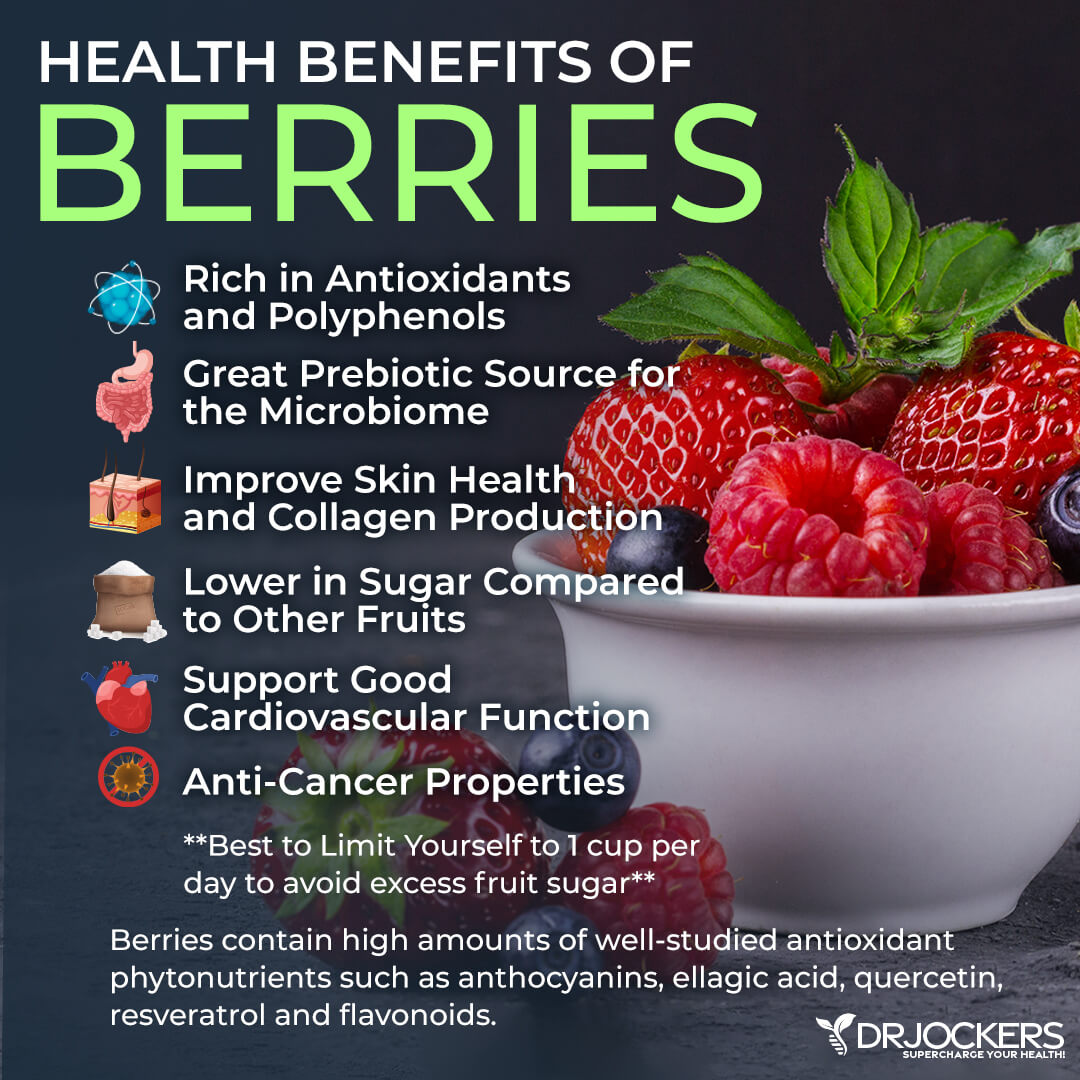
Avocados
Avocados are a great food to add in in phase II as they are nutrient dense and fairly easy on the digestive system as long as you don’t take in too much at once. I typically recommend starting with 1/4 to 1/2 of an avocado at a sitting. The long chain fatty acids do depend upon bile for digestion and so you want to limit the amount you get at first and than gradually increase each day.
Avocados are a terrific complement to a vegetable based meal. Most vegetables contain a high amount of carotenoid based anti-oxidants. Studies have shown that these antioxidants are lipophilic (fat-loving) and are absorbed best in the body when combined with a healthy fat such as oleic acid.
A study published in the Journal of Nutrition in March 2005 showed that adding avocados to salad increased absorption of alpha-carotene, beta-carotene and lutein 7.2, 15.3, and 5.1 times higher, respectively, than the average amount of these carotenoids absorbed when avocado-free salad was eaten. (6)
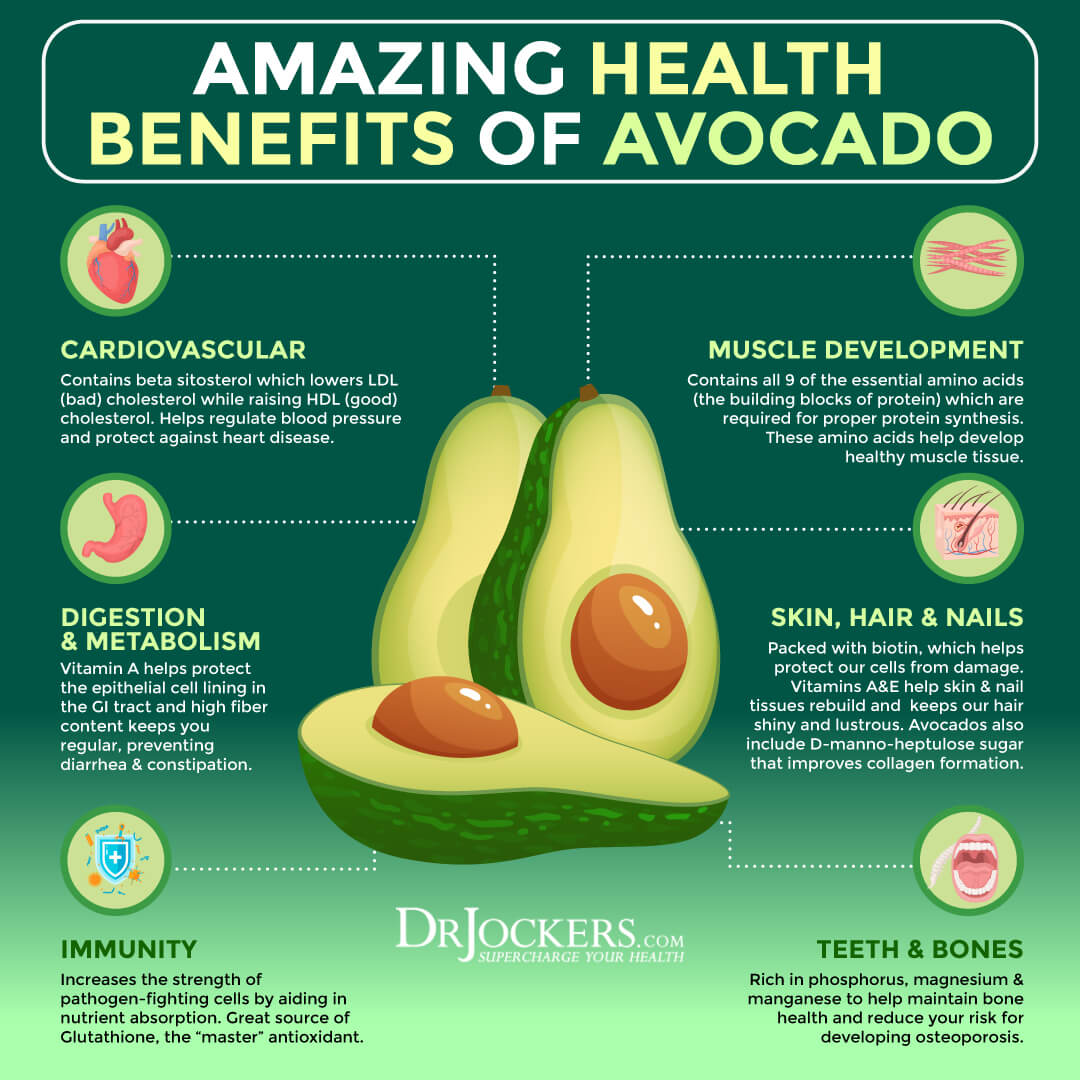
Olives & Olive Oil
Olives and olive oil fall in the same category as avocados in that they are healthy long-chain fats that are fairly easy on the digestive system. However, caution should be warranted on adding too many of these too quickly. I recommend starting with about 8-10 olives or 1 tsp of olive oil in a sitting.
Again, using these with raw or cooked vegetables is a great idea to help improve the nutrient absorption of the veggies. Olives are also a great source of trace minerals, polyphenols and prebiotic fiber to support the recolonization of the microbiome.
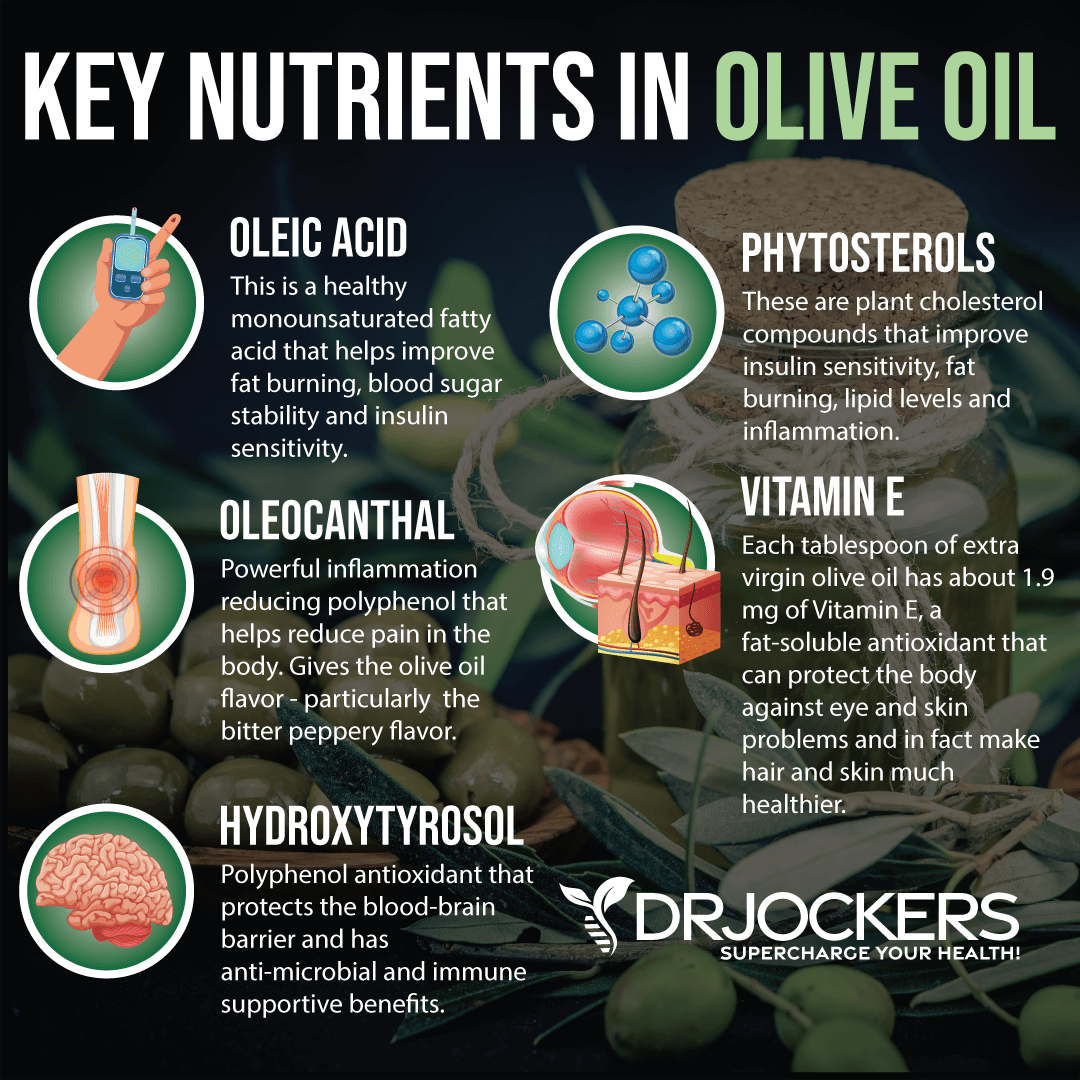
Conclusion:
Extended fasting has tremendous health benefits but certain precautions need to be taken before reintroducing foods. A very serious condition called refeeding syndrome can occur if you go back to your normal calorie load too quickly. In addition, your digestive tract needs time to turn back on before giving it foods that take more digestive juices to metabolize.
Breaking a fast of more than 3-5 days should be done gently with at least 2 phases before getting back to your normal diet. Following the instructions in this article will help you prevent refeeding syndrome and digestive distress and allow you recover well from an extended fasting experience.
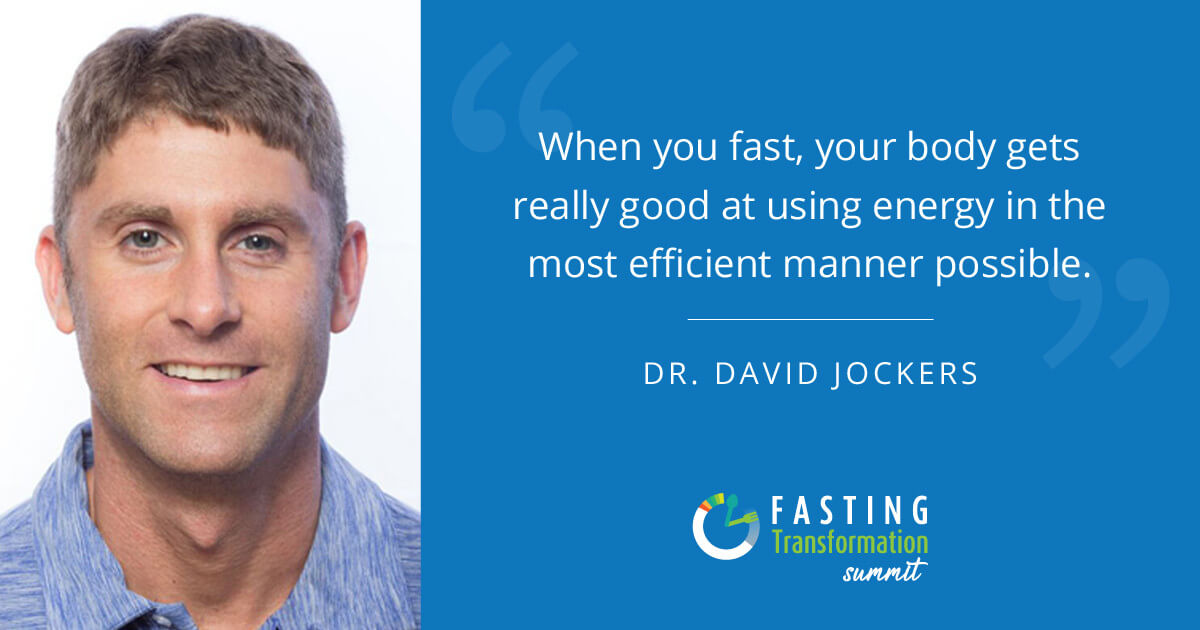
The Fasting Transformation Book
If you want to improve your metabolic health and burn fat, improve your brain and overall energy levels…intermittent and extended fasting are incredibly powerful strategies.
That is why I want to introduce you to my best-selling book, The Fasting Transformation. It goes into the most recent scientific research and strategies for implementing intermittent and extended fasting into your life.
This book is the best book on fasting the world has ever seen and I have read them all! It is now, my great honor to present this to you and I am deeply appreciative of your support!

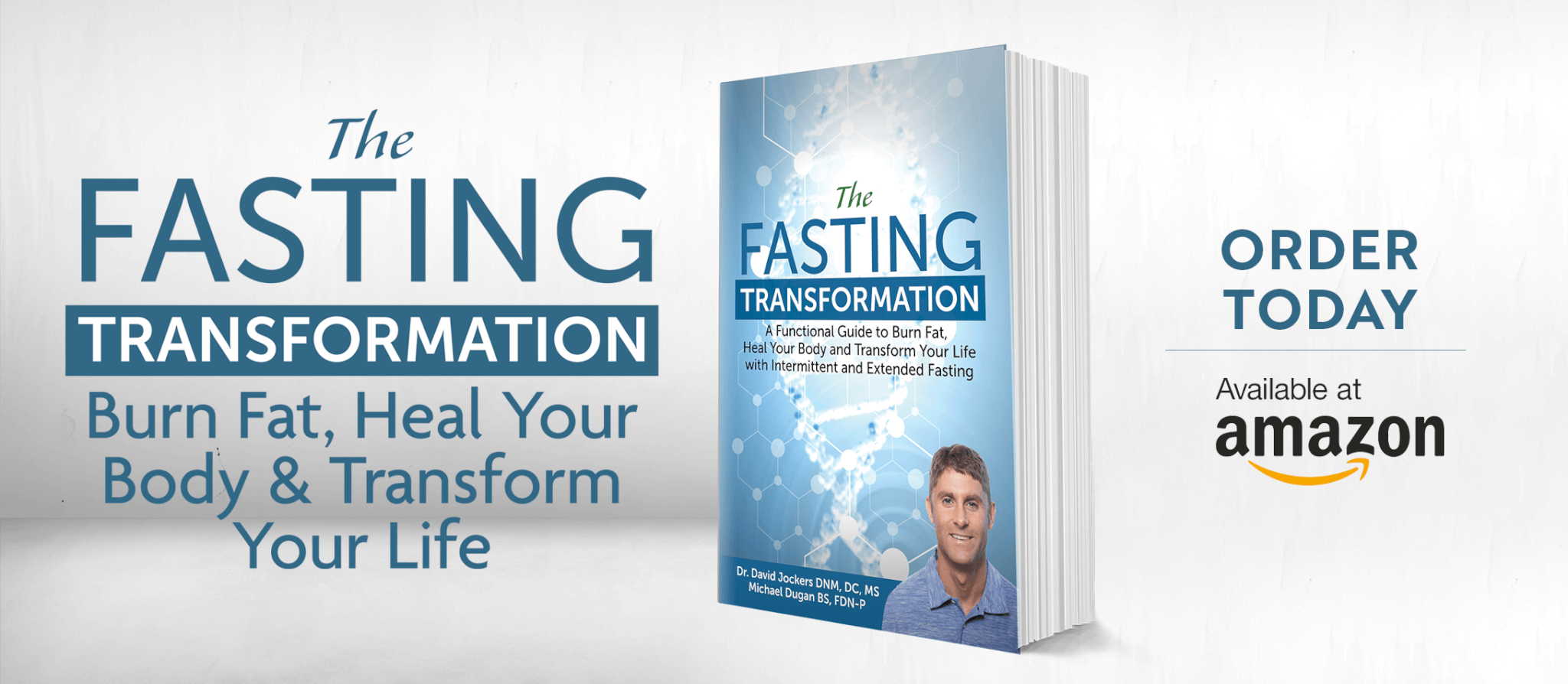



What about all the Oxicilates In vegetables and fruits??? I am reading so much about them lately and how they destroy your health… Especially spinach and berries…..
S-
Yes those can be an issue for some people while others seem to digest them just fine!
I just have a simple question.
I’m about to do a 7 days fast.
Will drinking herbal teas during the fast give me the same benefits as drinking water only.
I just love herbal teas
Hi Lola, Herbal teas are great while fasting. They can actually enhance autophagy! I provide a few recommendations in this article.
There’s been no comments for 3 or so years…hopefully none of you took the kill shots 🐄🐄🐄💉💉💀💀💀💀
Can I use homemade bone broth for breaking a 40-day fast in Phase I, even though it has bits of bone marrow and still has some fat and collagen in it?
Hey Chris, Yes, that will offer easy to digest nutrients for the gut.
Thank you for the reply. How about consuming raw eggs in Phase I of breaking a 40-day fast, of course, free-range and organic?
And for the Phase I soups, would greatly steamed broccoli and pureed into a soup be ok?
Thanks again. I’m ending my 40-day fast on 8/31, so I want to be prepared and super cautious.
Hey Chris, I don’t recommend eating eggs until your normal eating days. For phase I soups steamed and pureed broccoli would be a great way to refeed the body!
Hey mr Jockers I have colon cancer and I started fasting will this help me ?
Hey Michael, I am very sorry to hear this! Fasting can be a very powerful tool for healing cancer. This article outlines how fasting targets cancer growth and allows the body energy to repair. I would also recommend that you work with a functional health practitioner on your healing journey.
If I do a water fast of only 24 – 48 hours, do I still need to have one recovery day?
No, the digestive system dosn’t shut down until around the 48 hour mark. You are typically fine before that. The gray area would be between 36-48 hours and it may be best to break the fast with a protein shake or bone broth, etc and then have a larger meal a few hours later.
Really liked the article. I did wrong things when breaking a five day fast — and suffered pain because of my errant choices. So, for everyone, the article is ‘spot on’ regarding caution when reintroducing food after days of not eating.
I am in a four day fast now–no real end has been set. Trying to get less insulin resistant.
Will absolutely follow the guidelines here.
Thanks for sharing John!
Thank you for all this great information. I just finish my day 11 water fasting and wanting to go back and stay healthy. I am just courteous as how long phase I and II lasts? Thank you again.
I found the answer. Thank you wonderful people.
Great to hear that Audrey! Congrats on a wonderful fast!
Great article, it was very informative! I’ve ended an 18 day water fast 3 days ago. I’ve collected that I’m planning to recover for 6 days assuming my body doesn’t tell me I need to do anything differently. Anyway, I’ve been in phase 1 for 3 days mainly drinking bone broth, eating watermelon, and eating steamed spinach. Today would be the start of phase 2 where I’d begin incorporating smaller meals and low carb smoothies into my diet right? Are there any smaller meals that you’d recommend? I might’ve just repeated a lot of what you’ve gone over but I want to make sure I’m not missing any crucial details.
That is fantastic Ben! Yes smaller meals and progressively working up is a great idea!
Fantastic article exactly what I was looking for. I’m preparing to break my 40 day water fast, and wanted to know how many days do you recommend to re-feed?
Hey Ned, yes here is a helpful article where I go over this: https://drjockers.com/extended-fasting/
Hi Doc! I’ve been keto for over two years now with 9 months OMAD. I was wondering, I notice that I don’t have any digestive issues after 5 day fasts.. is this normal? The first one I ever did I broke the fast completely the wrong way (a selection of curries from our local takeaway!) but I still had no issues. I suppose it’s also to do with re-filling the nutrients? Many thanks for reading 🙂
That is great! It is a sign you have a very healthy digestive system!
Hi Doctor,
I’ve just completed a 5 day fast, and stupidly not knowingly had a big meal (1 avocado, 2 bananas, some nuts and half a small tub of hummus. What was i thinking!
That first day was horrible, and i’m on day two and feeling a bit better but still feeling some symptoms of refeeding syndrome (confusion, went for a long walk and found it slightly hard to breath)
For the third day should i monitor and slow down eating dramatically? or should i keep steady and increase my food?
Any advice recommended!
Sam
Sorry to hear that! Yes, you can start to slowly increase the calories. You may feel better doing more protein shakes, bone broth, fermented foods, etc. rather than big solid food meals.
Hi for a 30 day water cleanse how many days do I need to stay in refeed phase 1 and refeed phase 2 for?
I would do roughly 3-5 days in phase I and 3-5 days in phase II.
I have been experimenting with 3 36+/- fast days per week and normal eating the other days, within a 6 hour window. I feel great and have lost about 10 pounds this month, but when I break the fast, I get diarrhea for about 12 hours, no matter what I eat. I thought that the digestive system didn’t “shut down” that quickly? What should I be eating to stop this from happening, or is it a normal response?
Hey Ann, it is possible that it is too stressful on your GI system. You may want to try breaking the fast with some bone broth or a smoothie and see if that helps. You also may want to take some activated charcoal about 1 hour before breaking the fast to help grab up toxic bile which is often an issue with diarrhea.
Hello Dr. Jockers,
I am having the same problem as Ann with the diarrhoea after fasting (water/teas & bone broth during the fast) for 44 hours or longer. Broke the latest fast with bone broth, followed by ACV prior to consuming a WPI protein shake/smoothie with flaxseed meal, banana resistant starch, milk kefir & raw cacao.
I would like to do much longer fasts, the longest so far was 3 days, ending up in diarrhoea lasting several days after I started eating normally.
Can you please comment?
Many thanks 🙂
Hey Jana – I find that taking activated charcoal throughout the fast really helps with this. Take 500-1000 mg – 3x daily during the fast to help clean up the gut and the bile that is being released. https://drjockers.com/4-reasons-use-activated-charcoal/
Dr. Jockers,
Great information, and perfect timing. I’ll be completing a 40 day water-only season soon. I wanted accurate information and believe I’ve found it here.
There remain questions, however. I had planned to use watermelon juice (only, no pulp) as the first meal or two, then continue eating whole watermelon for a day but…you’re saying no more than half a cup to avoid liver strain. What other calorie source should one add for the remainder of the watermelon meals with pulp?
Years ago Jethro Kloss in ‘Back to Eden’ recommended against taking both fruit and vegetable in the same meal…not sure why, but I believe it cuts down on gas. In your opinion it’s okay to mix 1/2 cup of fruits with bone broth and vegetables during refeeding Phases 1 and 2?
Mr. Kloss also recommended never taking fruit with any form of meat. Care to comment on fruits and meats or meat broths together?
Hey Glenn, you can definitely do watermelon juice and watermelon. That is very easy on the digestive system. The only issue is the amount of sugar in the watermelon, but coming off an extended fast, I wouldn’t worry about that. Yes you can mix fruit, bone broth and vegetables.
I wouldn’t do a lot of fruit with meat but doing fruit with broth is fine because the broth is easy on the digestive system.
Thanks you!
(Was thinking in the future with the above fruit/meat question, not while breaking this fast.)
Did a successful gall bladder flush in 1990 but am diagnosed with cholelithiasis, with one large mass too large to come down through…
Others here have mentioned beginning to flush upon ending shorter fasts. I’m pretty weak after 26 days water only even after twelve 21 day water only fasts spread over 20 years. Roughly how long–in your estimation–might it take for a 63 year-old male with historically-stressed adrenals to regain strength for whatever it takes to begin the next thing…your recommended cleanses to clear liver and the bile pathways?
(No weight issues, no meds, very healthy diet 30 years, Hi Intensity Interval Training at the track, weight lifter)
That is hard to say Glen. I would recommend keeping your fasts to under 21 days if you are fealing weak. In addition, I would recommend TUDCA Plus to help open up your bile ducts better: https://store.drjockers.com/products/tudca-plus
Hi Dr. Jockers,
I am 3 days in of my 6 month fast. I am trying to get rid of my diabetes and weight. When I get off in March, can I do an alternate-day re-feeding of doing mostly bone broth, vinnegar water, and sauerkraut?
Hi Dr. Jockers,
I am 3 days in of my 6 month fast. I am trying to get rid of my diabetes and weight. When I get off in March, can I do an alternate-day re-feeding of doing mostly bone broth, vinegar water, and sauerkraut? Also, how long should my re-feeding days be? Is there any danger of staying on a fast this long? I weigh 202 lbs.
Currently, I am taking supplements every day with 2 tbs of vinegar water. I also drink 2 tbs of sauerkraut juice. Will this affect me getting an effective fast?
Hey Skylar,
Yes there is a lot of danger of staying on a fast for too long a period of time. Are you doing a 6 month fast – like 180 days? That is way too long. I would advise doing something like a 5-7 day fast each month and then refeed and eat well and do intermittent fasting for the other 23-25 days each month.
Hi Dr. Jockers,
Would you recommend 2 or 3 recovery days for a 7 day water fast? For 5-6 days, I saw that you recommended two recovery days and for 8-10 days, three recovery days. I know you mentioned it doesn’t hurt to err on the side of caution, but would two recovery days be okay for 7 days? Thanks for all the great information.
Yes I would. For sure 2 days and possibly the 3rd day.
Hi Dr. Jockers,
I am about to come off of a 21 day water fast and wondering if almond milk and/or other nut milks are okay in phase 1.
Yes they are Joseph!
Hi! Are potatoes safe to consume in Phase 1 after a 21 day water fast?
Thx!
Hey Elle,
No they are too starchy. You want to stick with liquid foods, fermented veggies and well steamed veggies.
Hello,
Coming up to the end of my 21 day water fast and am wondering about supplements and if multi-vitamins and vitamin D and C are fine to take as I reintroduce foods?
Yes absolutely and I would highly recommend those along with probiotics and digestive enzymes.
Thanks for the article.
I’m wondering it you consider honey OK with tea (not overly hot, as per ayurvedic thinking) in the first 2-3 days after a 7 day fast. I’m also wondering if black (fermented) tea during or after the fast is better than green tea, and if you consider high-fat milk/cream and stevia OK with black tea or coffee.
Also wondering if some butter (or ghee) is OK with the steamed vegetables in breaking the fast, and if there is some upper limit of how much fermented vegetables (within the overall caloric limit) should be consumed in either phase one or two of the refeeding period.
Also, any thoughts on monkfruit as a sweetener during or after a fast (in the refeeding period)?
Yes it is.
Yes all of those things are fine.
As a Christian, I practice prayer and fasting at different times of the year. I am currently 13 days into a fast. It’s not a super healthy fast. I drink a tablespoon of apple cider vinegar mixed with around 8-10 ounces of pure apple juice every morning. I drink a protein drink around noon. I drink around 11 or so ounces of V8 in the evenings. Every now and then I suck on pieces of either hard candy or vitamin c. I also will drink 1% chocolate milk from time to time.
As I said, not super healthy.
How would you suggest I end my fast? My last day will be March 16.
In the past my longest fast has been a round 3 weeks. I usually end it with a day of watermelon and maybe cantaloupe. The next day is toast and maybe yogurt and rice. Day 3 I add a salad with very little dressing. Day 4 I am back to my usuals foods, just not quantity.
Thanks. I look forward to hearing your response.
A question about labeling. I recall reading years ago that “natural flavor” was just a sneaky way of indicating MSG or similar, suggesting to the unaware consumer that the flavor was natural in origin (i.e. not from a lab) while actually meaning that the flavor was designed to taste natural but was actually lab made.
My beef bone broth lists “organic beef flavor” and “flavor” as the second and forth ingredients, is what I read accurate and is this something I should be concerned with when breaking a fast (or otherwise)?
If so, maybe this shady practice is worth an article of its own?
Not sure but I would imagine if it is organic it is probably not MSG.
So I did a quick search and found this, seems like things are less clear than they perhaps should be: https://www.hungryforchange.tv/article/sneaky-names-for-msg-check-your-labels. I suppose the question is how bad both MSG and free glutamic acids are for a person, and how much of them are in an average (processed) food product.
Could be nothing important, but could also (so it seems) be a big story that deserves more attention..
Quoting:
“On the other hand, many processed foods – including organic health foods – contain processed proteins that harbor free glutamic acids.
The FDA does not require manufacturers to label these foods MSG unless the “added ingredient” is 99% pure MSG.
If MSG is produced as a result of protein hydrolysis or a byproduct of protein processing, the FDA does not require MSG to appear on the label.
Moreover, a product labeled “No MSG” may still have MSG or free glutamic acid as a result of protein processing, as long as pure MSG was not added.
The truth is that protein-hydrolysis-based glutamates or MSG are found in just about every highly processed food. Even vegetable proteins are hydrolyzed to make veggies burgers and many other frozen or pre-prepared vegan and “health foods.”
When purchasing processed health foods, look for these common ingredients loaded with MSG that do not require an MSG listing on the label:
Hydrolyzed Vegetable Protein
Textured Vegetable Protein
Yeast Extract”
The article goes on to list 30+ ingredients that always or often contain processed free glutamic acid, often in things you wouldn’t expect.
After 30 days of water fasting, I’ve noticed some healing of scar tissue and I want to get as much out that as possible. So far I’ve only had water and some Celtic sea salt . Reviewing the excellent information on this website I want to ask you about how using the Gut Healing Protein and maybe some bone broth, pickle juice, ACV would affect continuing to heal the scar tissue.
That is great to hear Howard and yes these products will help support your healing! Blessings!
Hello Dr.,
Thank yo so much for your article. I’m on 5th day of 10 only distilled water fast.
Questions:
-I will be getting 2nd COVID vaccine shot 2 or 3 days into refeeding process. Should I be concerned?
– If drinking only distilled water, should I be concerned about electrolyte level drop?
– Drinking 2-3 cups of hot green or camomile tea a day ok?
I look forward to your reply. Thank you, Frank
Hello Frank, please do not get the vaccine. It is dangerous and untested and will not benefit your immune system. Instead, be focused on hydrating and taking electrolytes and yes, drinking herbal teas are very helpful for the fast.
Hello Doc!
I am very curious about taking supplements while on a 15 day water fast. Things like collagen, ashwagandha, and electrolytes. Should I wait till the introduction period to begin taking these so the body can purely work with itself during the fasting process?
Thanks for your articles I revisit them often 🙂
A long-time follower of your website. So I did 21 days of water fasting again after months of very bad self-indulgence run fueled by the pandemic. I have done it before so I didn`t have any problem doing it. Mentally and physically I felt great during the fasting.
This time I did a complete blood test before and after the fasting. From the cholesterol perspective, before the fasting, I was borderline.
High (desired 40) HDL Cholesterol: 50
Good (desired <150) Triglycerides: 138
High (desired <100) LDL Cholesterol: 148
Good (desired <5.0) Cholesterol Total/Cholesterol HDL Ratio: 4.5
High (desired <130) Non HDL Cholesterol: 175
After fasting, my results were much higher. I learned that it is because breaking fat cells and releasing them into the blood to use them for energy increases your cholesterol
High (desired 40) HDL Cholesterol: 30
Good (desired <150) Triglycerides: 94
High (desired <100) LDL Cholesterol: 165
High (desired <5.0) Cholesterol Total/Cholesterol HDL Ratio: 7.2
High (desired <130) Non HDL Cholesterol: 185
Also, my liver enzymes were high
(desired between 10-40) Aspartate Aminotransferase: 59
(desired between 9-46) Alanine Aminotransferase: 91
I guess I`d like to ask if all these because of the long-term fasting and they will normalize after I start eating normal and healthy?
Hello Beyti,
Yes when you are doing an extended water fast, you will see a lot of physiological changes like this because the body is breaking down fats to use for energy and high levels of autophagy are taking place to regenerate damaged liver cells. You have to go back on a normal eating routine for at least 2 weeks before retesting in order to test apples to apples with your initial lab.
Thank you 🙂
Love this article as it’s helped me manage my refeed when breaking my fasts. I’m looking for a recipe or guidance on what’s safe to use in a protein smoothie for phase 1 of the refeed. Is homemade preferred or is a store bought version recommended? TIA
Great to hear this! You can get a good quality protein powder (organic or using good ingredients ideally) and put berries and coconut milk in it.
thank you for this article. I am nearing the end of a 31 day juice cleanse and in phase 1 of referring I wanted to do a colon cleanse protocol of a teaspoon each of bentonite clay and psyllium husk 3 times a day. would love to know your thoughts on this and if it would be ok to do in this stage? thank you!
Yes you can do that. The psyllium husk may be a little irritating on your gut, some do well with it and others do not. You would also want to include the Oxy Powder to help get the bowels moving well. https://store.drjockers.com/products/oxy-powder
thank you, much appreciated
Yes of course! Blessings!
Why are fruits AND steamed vegetables both fine in phase 1? Fruits are higher GI (mostly) than vegetables and vegetables are baby food steam level soft for the gut while fruits are eaten the same way. 🤔
Yes you can do both fruit and steamed veggies.
Dear Doctor Jockers,
Thank you for this helpful article!
Can you drink coffee after breaking a 21 day water fast?
Regards.
Yes you can Jaco! But be sure it is a low-acid coffee or it could hurt your stomach lining. We like the Lifeboost Coffee the best: https://bit.ly/3qlzRxS
Hey dr, about to break a 5 day fast. As you mention the recovery time for that length is 2-3 days, after the 3rd day would it be okay to include foods like dairy and sweets ?
Yes in small amounts that is fine.
I’ve been trying to figure out, is tomato soup ok to break a 21 day water fast? I was told it was, but someone else said it might be too acidic. I’ve never done a fast like this before, and was told to break with soup. I’m thinking I’ll start with bone broth, but would soup be ok on the first or second day, even?
Hi, I don’t see anything in the article about whole grain breads and when it’s safe to consume bread after breaking a five day fast. Any thoughts on this? Maybe gluten free bread?
By the way, I have shared this article with dozens of people over the last 20 months since I first read it! Thanks for your articles. Super helpful.
Thank you for all your support! Blessings!
…hopefully none of you took the kill shots 🐄🐄🐄💉💉💀💀💀💀
Hello Bill, we don’t find that whole grains are healthy foods and do not recommend them. If you are going to eat them, I would wait until Day 3 after the fast.
Hey Doc, I broke a 66 hour water fast 3 days ago and I have really been struggling with the refeed, I seem to have some form of tachycardia that is brought on by eating carbs, I think it has something to do with still being in ketosis and being super insulin sensitive, do you have any advice on how I should handle this? Do I just continue to increase my carb intake daily until I’m kicked out of ketosis? Thank you
Harry, I would recommend making sure you are consuming enough salts, minerals and electrolytes.
I am so glad I found this article & I’m definitely going to follow you from now on. Quick question: can I take my supplements during my extended 3 day fast or avoid them? (Multi, C, calcium etc)
Hello Zee – those supplements you should take with food so I would avoid those. Here is a helpful article on taking supplements during a fast. https://drjockers.com/fasting-supplements/
Thank you for this excellent information! Just finished a 28 day water fast. I stopped because water was tasting sweet and so was my saliva. Is that normal?
I have been in refeeding stage I for 2 days. I can enjoy bone broth soup with well cooked greens but my stomach feels nauseous. And I feel hungry. Should I be eating more?
I don’t know why, but the water always tastes sweet to me around day 3 of any fast. I always figured it was because I was in ketosis. I guess I never wondered if it was unusual. I have done about 10 fasts ranging from 3 to 7 days without ill effects. If anybody knows about the sweet tasting water, I would love to know. It sure makes drinking water a lot better.
This is a great start. You can add in protein shakes at this point as well.
I have been doing intermittent fasting. I am type 2 diabetic – no meds. I did a 66 hr water fast. I did put ACV in my water 2x a day. My question is at about 30 hrs I got explosive slimy diarrhea. Any ideas why this happened? Was my body just getting rid of bad stuff? Or was it the ACV? Thanks!!
(I love your informed article!)
Probably my first long day I similarly put lemon in the water and quickly found that’s not a complete fast: what he recommended most was like a distilled or RO water with sea salt or pink salt especially the first few days. Diarrhea and enemas are fine for a short time, and I’d consider them natural. After the first time (barfing) I won’t do a long fast without urine enemas (so your host doesn’t blame you for busting the well’s pump lol) or water colonics, perhaps with a professional. Alternative is ending with a cherries to clear you out. You’re also gonna want to help the bacteria like WITH ACV/Sauerkraut and various root or other fibers, in moderation if not used to a healthy gut. I’ve not gone past 3 weeks though.
Yes your body was eliminating bad bacteria and endotoxins. Many people get this sort of response!
Hi,
Thank you for the encouragement. Now I understand why fats are limited at first. Curious what other juices and functions are costly for the mitochondria?
Please, can u edit two things, besides commas? By the minerals you said their (first one in the page) which should be “there” and wash “really well” not real good lol. Much Love and liquid
Hello, thank you for the wonderful article!
I keep hearing about phosphate and calcium as important electrolytes, but the only electrolytes I can get my hands on within my budget is sodium, potassium, and magnesium. Will I be okay if I don’t have phosphate/phosphorus? ( I may be able to get calcium, I don’t know yet)
I’m trying to be very conservative about what foods I have in each refeeding process to make sure I don’t get pain or bad side effects. Which leaves me with mostly broth, soup, pickled veggies, cooked veggies, protein powder, and a little fruit. There doesn’t seem to be much calories there, so I’m not sure how I’m supposed to increase my calorie amount slowly without also eating too much volume. Any thoughts? Thank you so much!
Also, I forgot to mention, I’m doing a 30 day fast. Maybe 40 if I feel okay.
Yes that is fine! You can add in avocados, olive oil, etc. as well.
I’m 7 days into a 30 day fast and I feel great. After I go through the refeeding/recovery phases, how long until I can start another long fast? (likely 30 days or more) I’m enjoying it so much so I’ll want to do it again asap.
I would wait at least 30 days at a minimum.
Hi Dr.Jockers,
I’ve had my first fasts in the last 3 years, 1 day, 2 days, 3 days… I did 4 days fasting twice so far. This week is my first 5 days fast. I’m on day 5 as I’m writing.
I have a question. I always read how you’re supposed to feel incredible on day 4 but that’s never my case. I’m like waiting for the “super feeling great” part of fasting but it’s never there. I feel fine I guess but not extraordinary. By day 3, I kinda forget what hunger feels like so I’m not sure if the weird “sensations” in my body are hunger or something else… Why some people can have a 14 days fast and feel amazing but I have a hard time with 5? Am I just not used to it? I mean it’s not horribly difficult but it doesn’t feel good like I’m always seeing in articles. The “mentally and physically energized” is never felt in my case. I do drink my daily water intake, I’m not taking anything else while I’m fasting.
But why am I like that? I wish I can enjoy it like everyone else.
Thanks for sharing. You may be dehydrated or need some more electrolytes. I also don’t know how lean you are and in some cases, very lean individuals don’t feel well on extended fasts.
I wish I had read this article sooner!! I just finished a 21 day water only fast and on day 4 introduced a little bit of organic rice noodles into my veggie broth.. I have never insulin crashed the way I did after taking the last bite. 3hrs unable to move, slept and woke feeling like a truck hit me. Now I have induced a terrible cold, lost my voice, feel like poop and hopefully haven’t ruined all my hard work accomplished during my fast:(
I just did a 72 day water fast. I was going to push on to 102 days but I scared myself today. I was filling flower pots with dirt and it kicked my butt.
I start refeeding in the morning.
Any suggestions?
Dr. Jockers,
Two questions. What is your stance on;
Extended coconut water fasting (10+ days combined with water and sea salt) directly from the coconut?
Coming out of such a fasting protocol directly into a 18-6 intermittent fasting regimen? So the refeeding for example wouldn’t occur until 12pm, still follow your parameters above, but obviously not necessarily build back to a previous caloric intake level?
Hi my name is yanai and I’ve recently become acquainted with water fasting. I’m doing a lot of research and I’m so so curious and loving what I’m reading, including this article.
I haven’t done a fast yet but I really really want to.
I have a history of disordered eating and mental health issues. I feel like my food is at the Crux of the whole journey of becoming more of myself and that fasting would be the….way forward since it sounds like it will give my body the chance to truly rest and repair in ways it has never known. What a miraculous thing for a system to rest after 26 years of hyperactivity. To me there seems to be nothing simpler and nothing more sensible than the water fast….I just haven’t done it yet and am warming up to it. I am grateful for the support of all those people who have done it and am grateful for this article.
I am wondering about whether to go to a center…I’ve heard about Tanglewood and buchinger and true north….for my first fast.
What do you think?
I’m wondering to enlist a coach.
And since I’m not working, what’s the best daily schedule to follow during a fast.
I’m looking for guidance and supportive team to kick this in the ass
😊😊😊
Are beans too starchy for Phase II? I was thinking of making some organic hummus with organic garbanzos/chickpeas, olive oil, lemon juice and sea salt.
Thanks!
Hey can I break my 30 day extended fast with kale,spinach,and 1/2 banana smoothie?
I have seen many different answers on How to Break a extended fast (2 week fast)-
I am not comfortable with an egg being the first meal.
How can I ensure that the cells are not being fed sugar?
How far along in the refeeding process can carbohydrates be introduced?
Have you heard of Vitamineral Green? Can that be a safe way to refeed?
I also heard of MCT Oil being an option.
A spoon full of MCT or a spoonful of EVOO?
Can you please share refeeding for a 2 week water fast?